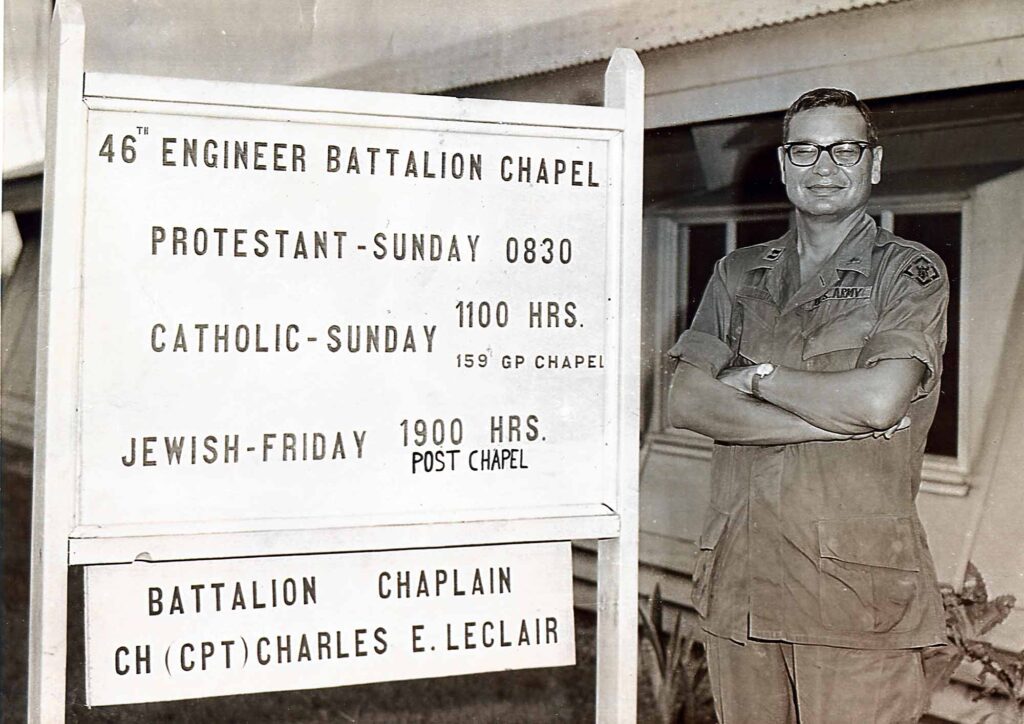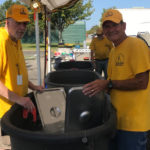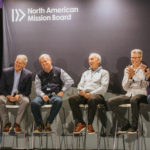
SHAWNEE, Okla. (BP) – The impact came out of nowhere — but Southern Baptist Chaplain Charles LeClair will never forget it. Suddenly, another truck barreled toward them, slamming into their jeep and sending LeClair hurtling to the ground.
It was September 1969. LeClair and his assistant were traveling a dirt road in South Vietnam between Long Binh Army Base — the largest U.S. base at the time — and Phu Loi Base Camp. As the chaplain for the 103rd Engineer Company at Phu Loi, LeClair had an important job to do — a memorial service for a battalion soldier killed in action.
They stopped at a narrow bridge crossing a river and waited for oncoming traffic to pass. As they waited, LeClair and his assistant were listening to a replay of Super Bowl III from six months earlier, when Joe Namath led the underdog Jets against the heavily favored Colts.

Then came the crash.
“When I regained my senses from being thrown to the ground, I discovered severe lower back pain,” recalled LeClair, the first Native American to serve as a chaplain in the U.S. military.
The impact was powerful enough to bend the steering wheel. Yet, even in that moment, LeClair’s thoughts remained fixed on the duty ahead.
When he arrived at the base, his commanding officer, also a Southern Baptist, said: “Give me your Bible. I’m going to take care of the service.”
“I can do it if I can stand up,” LeClair said. And that’s exactly what he did.
Before seeking medical care, LeClair performed his last ministerial duty in Vietnam, officiating a soldier’s funeral despite the intense pain.
LeClair grew up on a small farm in East Bressie, Okla., that was given to his father as a member of the Ponca tribe. At 14, he began attending Chilocco Indian School, an agricultural school for Native Americans.
“At Chilocco Indian School, I started attending Sunday School provided by the Home Mission Board of the SBC,” LeClair said. “That was where I first accepted Christ as my Savior. That decision has carried me my whole life.”
After graduating in 1948, LeClair joined the Air Force, hoping to be a pilot. While serving in Alaska, he became involved at First Baptist Church of Anchorage.
A group of 15 soldiers and two civilians had started FBC Anchorage just a few years earlier in 1943. During his time in Anchorage, he formed a lasting friendship with some of the other young people from the church.
“First Baptist Church of Anchorage, Alaska, changed my life plans in almost every way,” LeClair said.
FBC Anchorage ordained LeClair, who became the founding pastor of First Baptist Church of Palmer, Alaska. After his honorable discharge in 1952, he pursued studies at Oklahoma Baptist University and Southwestern Baptist Theological Seminary, continuing to pastor churches along the way.
It was in April 1967 that LeClair made history as the first Native American to be commissioned as a chaplain in the U.S. Army, a milestone that that is commemorated at the U.S. Army Chaplain Museum in Fort Jackson, S.C., which displays his uniform from that era.
Despite the constant dangers, LeClair appreciated his experience in Vietnam. He fondly remembers how eager the soldiers at Bien Hoa Air Base were to take part in worship services.

“They were so interested in what I was bringing to them, they would ask questions in the middle of my talking,” LeClair said during a 2016 oral history interview by the Oklahoma Oral History Program. “I’d never experienced that before!”
LeClair expected to return to pastoral life after his military service, but the accident ended that hope. The severe pain he endured right after the accident was just the beginning of a long period of recovery.
LeClair spent most of the next three years recovering at Army hospitals back in the United States. Because of the injuries, he spent most of the next three years in bed, only standing on Sundays. It soon became clear that he couldn’t faithfully serve as a pastor after leaving the Army.
“I was most honored to have served those splendid soldiers that year,” LeClair said of his year serving as a chaplain in Vietnam. “If I had known in advance the extent of my Army career and the final outcome, I would still do it proudly. My service to the American soldier and to my country was the highest privilege and honor of my life, by far.”
After completing his military service in 1972, LeClair was appointed as the first Equal Employment Officer for the Price Commission within the Executive Office of President Richard Nixon’s Economic Stabilization Program. LeClair later worked in the U.S. Labor Department and for Lockheed Space Operations, the primary contractor for the space shuttle program at Kennedy Space Center in Merritt Island, Fla.
LeClair was present at Kennedy Space Center in January 1986 when the Space Shuttle Challenger exploded 73 seconds into its flight, killing all seven crew members.
LeClair hopes Southern Baptists will say thank you to the Veterans in their lives Nov. 11 as they celebrate Veterans Day.
“If you are a Vietnam veteran, when you meet another one, shake his hand and welcome him home,” LeClair said. “If you are not a veteran, when you meet one, thank him for his service. On Veterans Day, find as many veterans as you can and thank them for their service.”
The U.S. Army awarded LeClair several awards and commendations for his service, including the Army Bronze Star and the Army Commendation Medal.



















